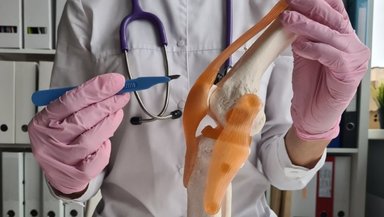Am I Too Young for a Total Knee Replacement? What You Need to Know in Your 40s and 50s

Medicine Made Simple Summary
Total knee replacement (TKR) is usually associated with older adults, but many people in their 40s and 50s face severe arthritis or knee damage that makes them consider surgery earlier. Younger patients often ask: “Am I too young for TKR?” This blog explains what TKR is, why some people need it earlier, the pros and cons of surgery at a younger age, how outcomes compare, and what factors influence the decision. Our goal is to help patients and families understand this choice in simple terms.
Introduction
Knee replacement surgery is one of the most successful orthopedic procedures. Traditionally, it was seen as a surgery for people over 60. However, rising cases of early osteoarthritis and injuries mean more patients in their 40s and 50s are now being considered for TKR. This brings up a key question: Is it too early for such a big surgery? This blog will break down the facts, pros and cons, and decision-making points in simple, patient-friendly language.
What Is Total Knee Replacement?
A total knee replacement (TKA) involves removing the worn-out or damaged parts of the knee joint and replacing them with artificial components made of metal and plastic. These parts are shaped to mimic natural knee movement. The goal is to reduce pain, improve mobility, and allow patients to resume daily activities. While it is generally safe and effective, the decision to undergo TKR depends on many factors beyond just age.
Why Consider Knee Replacement in Your 40s & 50s?
Younger patients turn to TKR mainly for three reasons: severe arthritis causing bone-on-bone pain, injury-related damage that leads to long-term problems, and quality-of-life issues when non-surgical treatments no longer provide relief. For many, the pain and disability become so overwhelming that surgery is considered the only way forward.
Pros of Having TKR at a Younger Age
Younger patients often see excellent results because they generally have stronger muscles, better healing ability, and higher motivation. Benefits include significant pain relief, greater improvement in daily activities compared to older patients, a chance to return to work and social life sooner, and higher satisfaction due to better functional outcomes.
Cons and Risks for Younger Patients
However, there are important trade-offs: artificial knees last 15–20 years on average, so younger patients face a higher chance of needing a second operation later in life. Revision surgery is more complex and often less predictable. High-impact activities may be limited, and there are risks such as infection, stiffness, or blood clots, though rare.
Factors That Influence the Decision
Doctors consider several aspects before recommending TKR for younger patients: severity of knee damage, impact on daily life, overall health, lifestyle goals, and whether non-surgical options have already been tried.
Recovery Timeline
Recovery after TKR is a process. Younger patients may recover faster than older ones, but expectations should be realistic. In the first 6 weeks, most patients need walking aids and physiotherapy. By 3 months, significant improvement is seen, and by 6–12 months, most patients regain full mobility with low-impact activities.
Risks and Complications
Both younger and older patients face surgical risks. For younger groups, the main concern is long-term implant wear. Key risks include infection, blood clots, stiffness, and implant issues. Surgeons will guide patients on how to prepare and reduce risks.
Patient Experiences
Some younger patients report life-changing improvements after TKR, regaining the ability to walk, travel, or play with their children without pain. Others feel frustrated if they expected to return to high-impact sports quickly. Patients with realistic expectations are usually the most satisfied.
Cost Considerations
In many countries, cost plays an important role. For younger patients, the financial burden may include not just the initial surgery but also the possibility of a revision later in life. Insurance coverage, type of implant, and hospital stay duration all influence expenses. Patients should get clear estimates beforehand.
The Future of Knee Replacement for Younger Patients
Advances in surgical technology, robotic-assisted procedures, and better implant designs are making TKR safer and longer-lasting. Some new implants may last 25–30 years, which could reduce the chances of multiple revisions for younger patients.
Conclusion
If you are in your 40s or 50s and considering a total knee replacement, age alone should not stop you from exploring the option. The decision depends on your pain, lifestyle, health, and willingness to accept revision risks. Consult with your orthopedic surgeon to decide what is right for you. Surgery may be the first step toward a pain-free, active life.
References and Sources
American Academy of Orthopaedic Surgeons. Knee Replacement Overview
NHS UK. Total Knee Replacement
Hospital for Special Surgery. Knee Replacement in Younger Patients







































